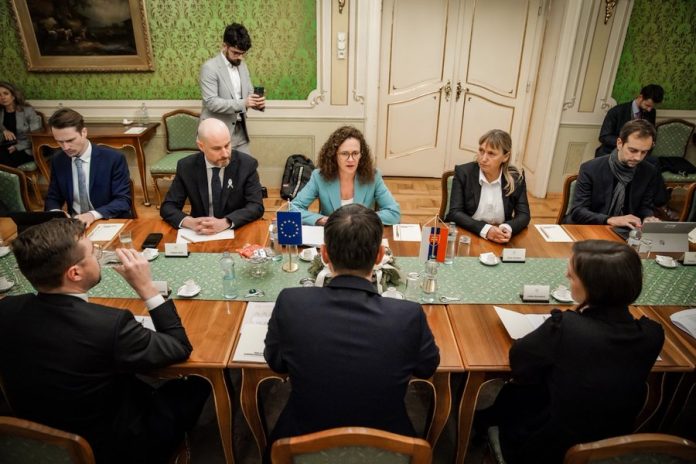A delegation of the Civil Liberties Committee discussed with government and civil society representatives ways to better protect the rights of vulnerable groups.
The ad hoc fact-finding mission was organised in response to the hate crime and terrorist attack in October that killed two individuals and left one injured. The Chair of the delegation Sophie IN ‘T VELD (RE, NL), Vladimír BILČÍK (EPP, SK), and Elena YONCHEVA (S&D, BG) had a full day of meetings on Friday 16. They met with several ministers of the caretaker government in dedicated settings, as well as the Prosecutor’s Office, high-level representatives of law enforcement, and NGOs and journalists. National parliamentarians were invited to meet with the delegation too. The delegation went to the bar where the shooting took place, from where they left to meet with the outgoing Prime Minister Eduard Heger, at the final meeting of their visit.
During their trip, they took stock of the relevant legal and political framework, and discussed concrete steps in the fight against hate in the country. The Chair of the delegation said: “We are shocked by the cruel and cowardly murder of Matúš Horváth and Juraj Vankulič and we would like to express our heartfelt condolences to their loved ones and full support for the LGBTIQ+ community in Slovakia. The entire EU has to be a LGBTIQ+ freedom zone, as declared by the European Parliament in 2021, and there is no place for hatred, racism and discrimination in our societies.
The delegation welcomes the efforts of the police, the NAKA and special prosecution services’ to swiftly carry out the investigations into the terrorist offence at the Tepláreň bar and the involvement of Europol in the case. We stress the urgent need to prevent and counter extremism, hate crimes and hate speech online and offline, including against members of the LGBTIQ+ community, and call on the government to allocate the necessary resources to the competent authorities. We were concerned to learn that the case is a reflection of a larger problem of radicalisation of the society and especially of youth in the online space, as indicated in the murderer’s personal notes, manifesto and social media posts. Any sense of impunity for far-right extremist groups needs to be eradicated, which is considered to be among the reasons for the alarming rise in violent actions and threats against minorities.
Many of our interlocutors described a toxic public debate, fuelled by offensive, aggressive and homophobic language towards the LGBTIQ+ community and minorities more generally, including by members of government, parliament and certain representatives of the Catholic Church in Slovakia. The delegation welcomes a clear message by the Police President that such extremist behaviour will not be tolerated in Slovakian society, and demands immediate steps by the government and the National Council to put an end to hate speech and defamation, especially in view of the upcoming electoral campaigns, including the fight against disinformation. We encourage to take an ambitious approach from the future Minister of Education in including topics such as sexual orientation or gender identity in the regular curricular program, and welcome the increased cooperation between the police and schools with the aim to tackle radicalisation. We also call to assign appropriate budgets to action plans and strategies anchored in the Antidiscrimination Act and equivalent legislation to allow for its efficient implementation.
The DRFMG is concerned about the deficient situation of equality rights in Slovakia, especially for LGBTIQ+ and Roma people. Ending discrimination and removing all obstacles those communities face when exercising their fundamental rights requires wide acknowledgement of the problems and a cross-party effort to address them. We call on the government to step up the efforts to improve the legal recognition of same-sex couples and their children and to quickly adopt other related legal reforms, including appropriate health care procedures for transgender people.
While recognising the limited powers of the caretaker government, we are encouraged by the Prime Minister’s commitment to effectively use the tools at its disposal. The DRFMG will stay vigilant and continue to closely monitor all relevant developments in Slovakia in the future, including the ongoing reforms of the judiciary, the powers of the state prosecutor and the annulment of charges against high-profile individuals.”
On 12 October 2022, 19-year-old Juraj Krajčík headed to Tepláreň, one of Bratislava’s few LGBTIQ+ bars, and shot indiscriminately, killing two people (Matúš Horváth and Juraj Vankulič) and injuring another. Earlier that day, he had published a far-right manifesto online. He was found dead the following day, having committed suicide. The attack was declared an anti-LGBTIQ+ hate crime and, as of 17 October 2022, a terrorist attack. The shooting is under investigation and a news embargo.
In Slovakia, marriage is constitutionally defined as a union between one man and one woman, and there is no same-sex marriage or civil partnership. In recent years, multiple anti-LGBTIQ+ legislative proposals have been tabled. Only 31% of Slovaks agree that LGBTIQ+ individuals should have the same rights as heterosexual people. This is the lowest share in the EU and it has actually fallen by 5% since 2015.
The Democracy, Rule of Law and Fundamental Rights Monitoring Group (DRFMG) has been closely monitoring the situation in Slovakia since the murder of journalist Jan Kuciak and his fiancée Martina Kušnírová in 2018.
On 15 December, the Slovak government lost a vote of no confidence and was asked by the President to remain in office as a caretaker administration in anticipation of the elections.

